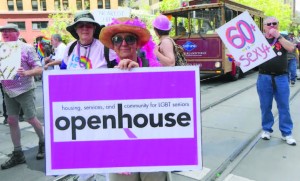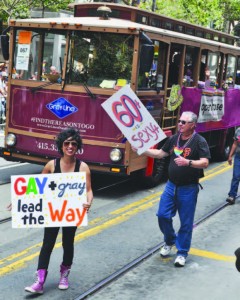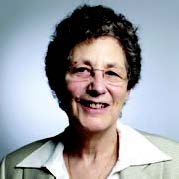 How do you feel about getting old? People often cringe at the idea, or even the word! They dispute me when I claim the term. Yes, at 70 I’m clear that I’m old. That doesn’t mean I’m giving up or that I need reassurances that I don’t look my age. I’m proud to be participating in the profound changes our culture is making. For years, I’ve been organizing for women’s rights, LGBTQ liberation, peace and economic justice, and fighting racism. Now it’s time to take some time for me, even if it means adding another cause to my agenda. Our culture’s denial of the gifts and beauty of age is the oppression of ageism.
How do you feel about getting old? People often cringe at the idea, or even the word! They dispute me when I claim the term. Yes, at 70 I’m clear that I’m old. That doesn’t mean I’m giving up or that I need reassurances that I don’t look my age. I’m proud to be participating in the profound changes our culture is making. For years, I’ve been organizing for women’s rights, LGBTQ liberation, peace and economic justice, and fighting racism. Now it’s time to take some time for me, even if it means adding another cause to my agenda. Our culture’s denial of the gifts and beauty of age is the oppression of ageism.
Most of us experience youth as a decidedly mixed bag. Thinking back, we see that to be young wasn’t always joyful or even pretty. Why should we believe the other side of this false dichotomy? To be old does not mean we are sad or ugly. Old Lesbians Organizing for Change (OLOC) presents an alternative. A national organization with an active Bay Area chapter, OLOC seizes the initiative and overturns stereotypes of aging.
 Noted author Jewelle Gomez found the July 2014 OLOC national gathering in Oakland “unnerving because (like most people) I never thought about who I’d be as an old woman. Even though I was raised by old women—my great grandmother and grandmother—I never projected myself into their ages,” she told Epochalips. “I guess internally we imagine ourselves forever in our 20s. But inspiration was the most remarkable aspect of the weekend. I got to see other gray haired women…and some blue…some purple…some magenta…who were part of my lesbian feminist coming of age: poets Avotcja and Chrystos, and singers Ronnie Gilbert, Alix Dobkin and Margie Adam. It was a reunion even if you didn’t know every one of the almost 300 women who attended.”
Noted author Jewelle Gomez found the July 2014 OLOC national gathering in Oakland “unnerving because (like most people) I never thought about who I’d be as an old woman. Even though I was raised by old women—my great grandmother and grandmother—I never projected myself into their ages,” she told Epochalips. “I guess internally we imagine ourselves forever in our 20s. But inspiration was the most remarkable aspect of the weekend. I got to see other gray haired women…and some blue…some purple…some magenta…who were part of my lesbian feminist coming of age: poets Avotcja and Chrystos, and singers Ronnie Gilbert, Alix Dobkin and Margie Adam. It was a reunion even if you didn’t know every one of the almost 300 women who attended.”
OLOC is open to Lesbians 59 years and older, welcoming partners and caregivers of any age. These generations have been breaking ground most of our lives. Some were dykes before the Compton Cafeteria and Stonewall riots. Others came out in the Lesbian-feminist wave that struck Women’s Liberation around 1970, heralded by the Radicalesbians manifesto: “The Woman Identified Woman.” Still others found our identities later in life. But among us are women who put their bodies on the line for civil rights, pioneered abortion rights and women’s music, took rape and domestic violence out of the closet, brought women into trades historically closed to them, created feminist art and literature, and played important roles in so much change it is hard to describe what the old world used to look like.
 At this stage of life, there is plenty to discover and share. It is also time to find space for play and rest. Bay Area OLOC holds three daylong meetings, two overnight retreats, and a picnic every year. Events are open on an ability-to-pay basis, and we embrace class and ethnic diversity. Wheelchairs are accommodated, we always use a sound system, and we are largely fragrance-free. A number of support groups have organized out of OLOC, offering members a more intimate solidarity for the process of aging.
At this stage of life, there is plenty to discover and share. It is also time to find space for play and rest. Bay Area OLOC holds three daylong meetings, two overnight retreats, and a picnic every year. Events are open on an ability-to-pay basis, and we embrace class and ethnic diversity. Wheelchairs are accommodated, we always use a sound system, and we are largely fragrance-free. A number of support groups have organized out of OLOC, offering members a more intimate solidarity for the process of aging.
What makes OLOC special? It is a sisterhood that understands the intersection of sexism, ageism, and homophobia. This affinity produces a community that members experience as life-affirming. Features of OLOC that I find important include:
A rich fund of experience to draw on Women bring unique resources to OLOC. Besides serving as role models, their talents show up in writing, arts, crafts, gardening, music, and healing. When we check in at meetings and retreats, I am amazed at the wealth of activity in the circle. Retreats feature an open mike, and members lead workshops ranging from creativity to grief and loss, sex and intimacy to meditation, and there is plenty of time for skinny-dipping, conversations, and naps.
Courage and the pursuit of well-being Members of OLOC know it takes courage to deal with changes in our bodies and minds, and the losses that come with age. In coping with all of this, we provide each other mutual support and practical suggestions for dealing with the medical, mental health, housing, and social services systems. We do not deny the challenges of age, but facing them together gives us strength.
Political understanding and diversity OLOC members share a critical understanding of life in today’s world and OLOC is a place where progressive values are accepted. OLOC belongs to the California Alliance for Retired Americans, which is dedicated to preserving, expanding, and improving Social Security and Medi-Care. We seek out connections with diverse groups such as Black Women’s Lives Matter, climate justice, and Queer Women of Color Media Arts Project. OLOC takes pride in advocating for equality and justice.
If you or an Old Lesbian you know would like to meet members, OLOC’s upcoming picnic will be a great opportunity. It will be held at Live Oak Park in Berkeley on July 26. For more information, or to connect with OLOC, call Pat Cull at (415) 637-5002 or email her at pat@oloc.org
Susan Chacin, born in 1945, is a retired social worker living with her spouse in Berkeley. She can be reached at susanchnew@gmail.com. Susan is active in Democratic Socialists of America East Bay, and participates in Bay Area OLOC’s Coordinating Council and Political Action Committee.
 Dr. Marcy Adelman oversees the Aging in Community column. For her summary
Dr. Marcy Adelman oversees the Aging in Community column. For her summary
of current LGBT senior challenges and opportunities, please go to: sfbaytimes.com/challenges-and-opportunties
Recent Comments